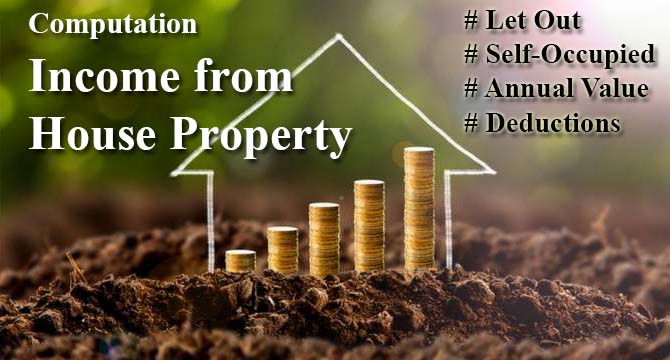Under section 10 of the Income-tax Act 1961 following incomes from house property are exempted from tax. These incomes are not to be included in the total income of assessee. Hence no tax is payable on such incomes. These incomes are : -
1. Agricultural House Property [Section 2(1)(c)].
Income from such house property which is situated on or in the immediate vicinity of agricultural land which is used for agricultural purposes by cultivator is exempted from tax.
2. Income from Property held under Trust Wholly for Charitable or Religious Purposes [Section 11(1)(a)]:
Income derived from property held under trust, wholly for charitable and religious purposes, shall be exempt—
-
to the extent such income is applied in India for such purposes; and
-
where any such income is accumulated or set apart for application to such purposes in India, to the extent to which the income so accumulated or set apart is not in excess of 15% of the income from such property.
3. Income from Property held under trust which is applied in part only for Charitable or Religious purposes [Section 11(1)(b)]:
Income derived from property held under trust in part only for such purpose, shall be exempt:
-
to the extent such income is applied in India for such purposes, provided, the trust in question is created before the commencement of Income-tax Act, 1961 i.e. before 1.4.1962; and
-
where any such income is finally set apart for application to such purposes in India, to the extent to which the income so accumulated or set apart is not in excess of 15% of the income from such property.

4. Income from Property held under trust which is applied for Charitable Purposes outside India [Section 11(1)(c)]:
-
Income derived from property held under trust, created on or after 1.4.1952 for charitable purpose which tends to promote international welfare in which India is interested, shall be exempt to the extent to which such income is applied to such purpose outside India. Religious trusts are not covered here.
-
Income derived from property held under a trust for charitable or religious purposes, created before 1.4.1952, shall be exempt to the extent to which such income is applied to such purposes outside India.
In the above two cases, it is necessary that the Board, by general or special order, has directed in either case that it shall not be included in the total income of the person in receipt of such income. |
5. Self-Occupied but Vacant House [Section 23(3)].
in case an assessee keeps one of his own houses reserved for self-occupation but is living in a rented house elsewhere due to his employment or profession the income from such house is taken to be NIL.
The annual value of self-occupied house shall not be NIL :
-
if such house or part of the house is actually let during the whole or any part of the previous year; or
-
any other benefit therefrom is derived by the owner from such house.
In the above cases, the annual value shall be determined as per provisions applicable for let out properties i.e. under clause (a), (b) or (c) of section 23(1). |
6. House used for Own Business or Profession.
There is no income chargeable to tax under this head from such house property.
7. Property held by Registered Trade Union [Section 10(24)].
Income from a house property owned by a resIstered trade union is not to be included in its G.T.I.
8. Income from House Property held by following shall be exempted :
-
House property held by a local authority.
-
House property held by a scientific research institution.
-
House property held at a political party.
-
House property held by a university and any other educational institution working for spreading education and not to earn profit.
-
House property held by a hospital or medical institution working for the spreading of medical services to people and are not meant for earning profit.
-
It is income from a farmhouse.
9. One House Property (a palace) owned by a former ruler of Indian states.
Ex-rulers of Indian states may be owning many palaces but only one palace of their choice shall be treated as a self occupied house and shall be exempted.
10. One Self-Occupied House.
In case assessee owns one residential house, the net annual value of the same shall be taken as nil but in case he owns more than one house, then only one of his choice but normally of higher value shall be treated as a self occupied one and other/others are treated as deemed to Je let out. |





